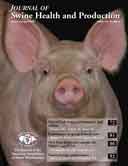Abstract:

Effect of out-of-feed events and diet particle size on pig performance and welfare
Michael C. Brumm, MSc, PhD; Sheryl L. Colgan, BS; Kelly J. Bruns, MSc, PhD
PDF version is available online.
Objective: To determine the impact of repeated out-of-feed events on pig performance.
Materials and methods: In each of two experiments, out-of-feed events of 20-hour duration were created by closing the feeder delivery devices from noon until 8:00 am the following morning. In Experiment One, the treatments were never or weekly out-of-feed events for a 16-week period, and 1266-micron versus 1019-micron mash feed-particle size. In Experiment Two, the treatments were zero, one, two, or three out-of-feed events on random days every 2-week period in the 16-week study. In each experiment, there were four pens per treatment combination or treatment and 15 pigs per pen.
Results: Weekly events resulted in a 68-g per day lower daily gain for the first 8 weeks (growing period; P < .001), and 35-g per day lower gain over the entire trial (P < .01), compared to the never out-of-feed treatment, with no impact on feed conversion (P > .05). Feed conversion was better when feed particle size was 1019 microns versus 1266 microns (P < .01). In Experiment Two, there was a linear decrease in daily gain with increasing numbers of out-of-feed events during the first 8-week period (P < .01), with no impact during the second 8-week period. There was no effect of treatments on feed conversion.
Implications: Repeated out-of-feed events have a bigger impact on growing pigs than on finishing pigs, with the impact expressed as lower weight gain with no effect on feed conversion.
Keywords: growth, feed deprivation, particle size
![]() Cite as: Brumm MC, Colgan SL, Bruns KJ. Effect of out-of-feed events and diet particle size on pig performance and welfare. J Swine Health Prod 2008;16(2):72-80.
Cite as: Brumm MC, Colgan SL, Bruns KJ. Effect of out-of-feed events and diet particle size on pig performance and welfare. J Swine Health Prod 2008;16(2):72-80.
Search the AASV web site for pages with similar keywords.
